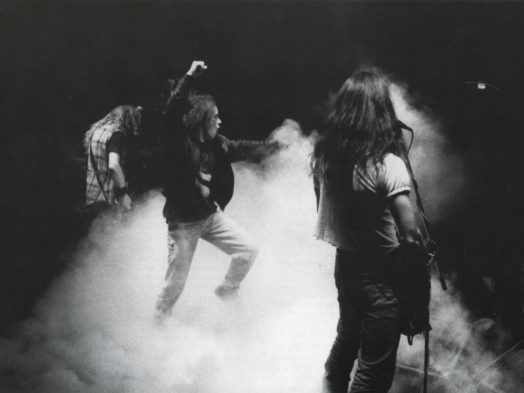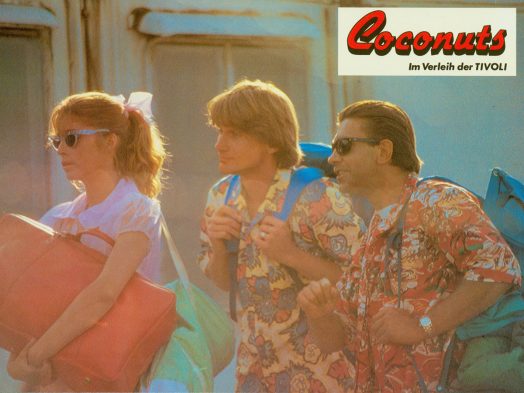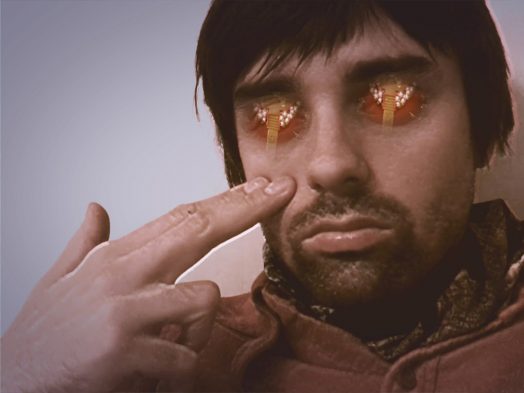1000 Takte Film
Pop – Film – Austria
With its special historical program “1000 Beat Film,” the Diagonale’17 searches for (Austrian) pop culture’s influences on Austrian film and vice versa – spotlighting, multifaceted, inquisitive, and entertaining. The Austrian Film Museum, Filmarchiv Austria, ORF archives, and the musician and journalist Robert Rotifer work together from various viewing and listening angles to investigate pop cultural phenomena in film and television.
In conjunction with terms such as “Austropop 2.0,” Austrian pop culture, especially the latest generation, has enjoyed a great deal of attention in recent years. Furthermore, pop has lately appeared more and more as a venue for political issues here in Austria. Therefore, as follow up to last year’s series Austria: Forget it, the Diagonale presses forth in its examination of Austrian identity and motion pictures this year in the “pop scene.” The special focus gathers works where pop is involved with subversion, counterculture, and dissidence, as well as films fixated on the present, driven by an inquisitive, immediate belief in progress. And finally, included are also films created in an era when pop had been self-referential for quite some time and began to reflect on its own cultural methods. An initial overview:

The Bands, Still: Sammlung Österreichisches Filmmuseum
Starting from the moment when pop, film, and political action came closer together in a special way with the occupation of the Arena in Vienna in the summer of 1976, the program of the Austrian Film Museum put together by Alejandro Bachmann looks at the intertwined effects of pop and film: The figure of the drifter is at the center of a move aiming to discover how pop culture becomes visible in film, what there is about pop that might be fundamentally cinematic, and how pop and film mutually infect one another—whether in documentary approaches or fictional forms. The program entitled “This is not America – Austrian Drifters” collects works by John Cook, Peter Ily Huemer, Barbara Albert, Kurt Kren, Dietmar Brehm, Karin Fisslthaler, and many more.
Kiss Daddy Good Night (US 1987, D: Peter Ily Huemer, Original version with German subtitles)
Avant-Pop Special Report (no dialogue)
Avant-garde approaches to pop, traces of an encounter that appears full of frictions: In its more commercial offshoots, pop tends to polish and seal up, while the avant-garde quite often focuses on the fractures and scars. Ten Kalkito-Clips by Dietmar Brehm, cinematic formations of Pop art, are joined by pieces that work in different ways with the appearances, structures, and tonalities of pop – in that they translate, overheat, and satirize them.
More

Coconuts, Still: Filmarchiv Austria
The program “Austro-Pop-Film – Celebrity Cutouts in Austrian Cinema” curated by Paul Poet of the Filmarchiv Austria shows, on the other hand, rock and pop greats in leading film roles: Thus, along with Hansi Lang, also Rainhard Fendrich and Wolfgang Ambros take on starring roles in the program. As a bonus track, Paul Poet has brought along two cinematic time capsules from the ORF archive.
Also from the ORF archive is the relentless portrait of a pop icon: Hansi Lang – Ich spiele Leben (D: Rudi Dolezal, AT 1984) shows its protagonist at the peak of his career at a concert bursting with energy in the Prater stadium, before Dolezal turns to focus on the fragility of a man living on the edge, and the consequences of a life constantly in the limelight: “For some, the openness with which Hansi Lang calls things as they are, is shocking, but I see it as a much greater achievement than putting on a mask and pretending,” wrote the director in the accompanying press release in 1984.

Durchgang, Still: Wolfgang Möstl
Robert Rotifer provides the view from the perspective of the Austrian music scene. The journalist, radio host, musician, and former curator of the Popfest Vienna devotes his two programs to techno and indie pop. The connection between youth culture and the electronic music genre hereby opens up in and through Stefan Ruzowitzky’s film debut Tempo (AT 1996, D: Stefan Ruzowitzky, Orginal version with English subtitles), whose soundtrack features the music of major players in the scene, such as Peter Kruder and Patrick Pulsinger. The latter, for his part, also appears in the short ORF documentary Techno in Wien (AT 1992) about the scene flourishing at the time around the legendary Gasometer raves. The second program sampler revolves around the director and musician Wolfgang Möstl – known for his bands Mile Me Deaf, Sex Jams, etc.: Screening along with the the experimental travelogue Durchgang (AT 2017, no dialogue) of his band Mile Me Deaf are the DIY punk aesthetic music video You’re Walking Maze (AT 2012) as well as the prize-winning feature film Talea (D: Katharina Mückstein, AT 2013, Original version with English subtitles), whose film music Möstl created together with the musician and artist Veronika Eberhart.
Last but not least, this year’s focus precipitates in the cinematic city discoveries by Street Cinema Graz: On the streets of 8020 Graz, the past and present stomping grounds of the Graz music and pop culture will become projection screens for music videos. While the film program will be exhilarating, the tour will also prompt contemplation on the connections of pop and the city.
Hidden Track: The title of the series is a reminiscence of the band Chuzpe and its legendary album title “1000 Takte Tanz (1000 Beat Dance).” Also involved with this band is a documentary film that stretches the historical focus into the current film competition. Further updates on the program will follow.


